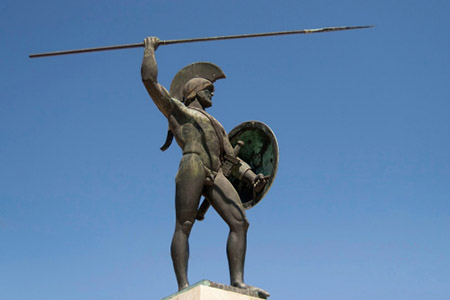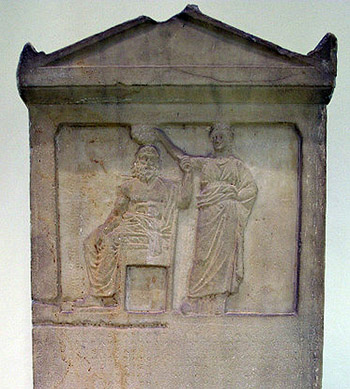Sparta and Athens had access to similar resources and emerged within a few hundred miles of each other. Only one of these city-states seemed to see value in building an empire, however. After creating the world's first democracy, Athens began to trade with other civilizations far from Greece. These two events energized the city-state and caused its citizens to look beyond the borders of their own city with an eye toward empire-building. Learn more about the differences in these tabs.
Athens and Sparta
Sparta: The Art of War
Athens: Power of the Mediterranean
Athens: Democracy vs. Oligarchy

Sparta and Athens were both ancient Greek city-states, but they had very different cultures. Sparta was relatively land-locked, and it did not want to engage with the world outside its city-state. Spartans believed their culture was superior to all others and wanted to protect it by keeping the rest of the world out. Athens, on the other hand, was a great trading city welcoming and dominating trade in the Mediterranean.
Which city was most likely to build a defensive wall?

Surprise: The answer is Athens. This outgoing city built 12 miles of fortifications around itself to express the power of the city-state and to defend it from attacks by hostile parties who might sail into the harbor. Spartans chose to defend their city-state with the military power and courage of their men alone, and had no wall.

This image of King Leonidas of Sparta symbolizes militaristic Spartan culture. Spartans valued personal bravery and strength above all. They devoted their cultural energy to training their soldiers. Sparta built no monumental architecture, developed no complex code of civil law, and created no unique art, literature, or music. Sparta did not understand or appreciate the dynamic forces at work in Athens, and looked down on its trade, openness to foreigners, and democratic government as signs of weakness.
Why did Sparta think Athens was weak?

Athens did not develop its army and relied on trade with strangers for its wealth. Spartans devoted their culture to their army and did not develop the art, trade, and government system that made Athens so different and, in the Spartans’ opinion, so weak.

Athens was always outward-looking. This image is of the modern city, but it shows how ancient Athens was situated--near the water, with buildings clustered around the central hill of the Acropolis, where the mighty Parthenon rose into the sky, dominating the city and shining like a beacon of Athenian power to trade ships that approached the port. Athens built a great navy and a great trade fleet, supported in large part by its trading partners: Each partner paid a fee, and in return its ships were protected by the Athenian navy. Those who failed to pay up were attacked.
Where did Athens’ strength lie?

Athens' strength lay in its naval power and its control of trade, which allowed it to tax its trading partners. This taxation, along with trade income, allowed Athenians to build a great city with monumental architecture that drew people from all over the Mediterranean world.

This image shows Demos, the people of Athens, being crowned by Democracy. Each city-state in Classical-era Greece chose its own form of government. Prior to the Classical era, most chose monarchy, a government led by a chieftain or king--one individual whose word was law. During the Classical era, rule by oligarchy became more common. Oligarchies are small groups of people who share government responsibilities, as well as the power that comes with leadership. A few Greek city-states, most notably Athens, developed a new form of government called democracy, in which the power of the government was distributed among the majority of the people, who elected officials who would represent their interests when they met to govern.
How did Athens end up with such a unique form of government when the city-states around it were mostly oligarchies?

Athens went through a chaotic period in the early 6th century BCE. A leader named Solon was chosen to lead the government temporarily and introduce reforms to make it more stable and more fair. Solon dictated reforms that laid the foundation for democracy in Athens. His key idea was to give power to a broader range of citizens. By the time Pericles led Athens (461-429 BCE), all free male citizens of Athens participated in its government.
Question
What was the main difference between Athens and Sparta?